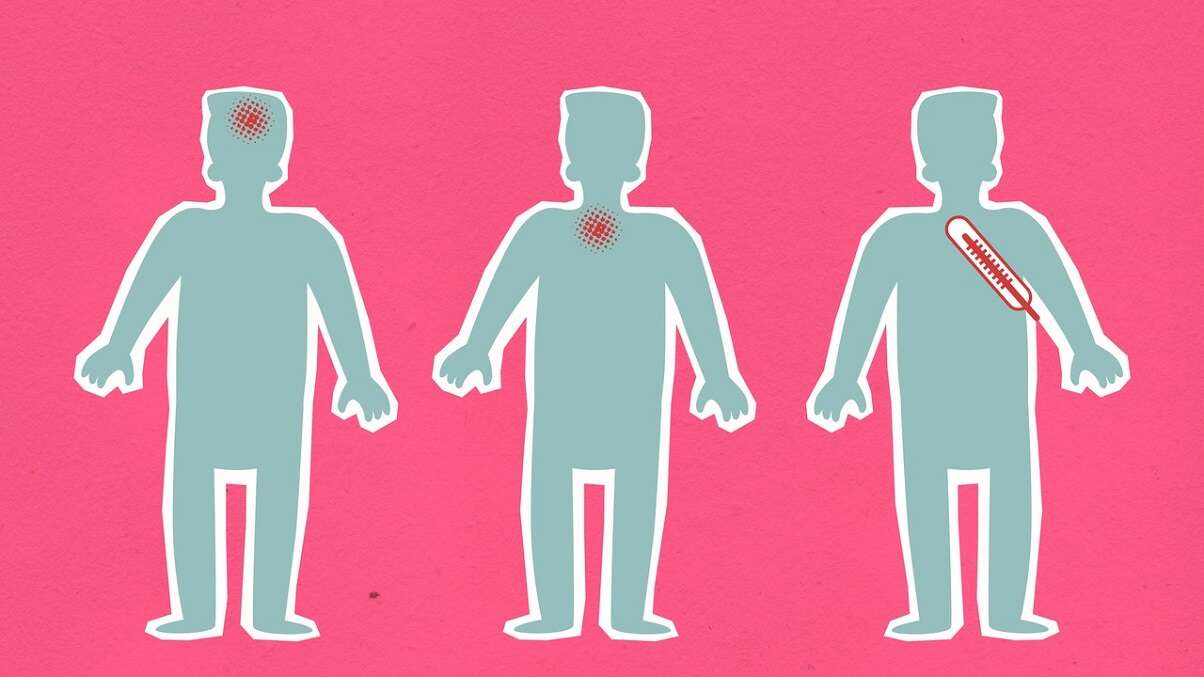Dyspepsia Symptoms, Causes & More
 Article Sources
Article Sources
- 1. Harmon, R Christopher, and David A Peura. ‘Evaluation and Management of Dyspepsia.’ Therapeutic Advances in Gastroenterology, SAGE Publications, Mar. 2010, www.ncbi.nlm.nih.gov/pmc/articles/PMC3002574/
- 2. Madisch, Ahmed, et al. ‘The Diagnosis and Treatment of Functional Dyspepsia.’ Deutsches Arzteblatt International, Deutscher Arzte Verlag, 30 Mar. 2018, [www.ncbi.nlm.nih.gov/pmc/articles/PMC5938438/.](https://www.ncbi.nlm.nih.gov/pmc/articles/PMC5938438/.)
- 3. Pesce, Marcella, et al. ‘Diet and Functional Dyspepsia: Clinical Correlates and Therapeutic Perspectives.’ World Journal of Gastroenterology, Baishideng Publishing Group Inc, 7 Feb. 2020, www.ncbi.nlm.nih.gov/pmc/articles/PMC7015717/
Commonly referred to as indigestion, dyspepsia is pain or discomfort in the upper abdomen. It may occur after eating certain foods or drinking specific beverages. Dyspepsia is a symptom rather than a disease. Up to 30 percent of the population experience it at least once.1Harmon, R Christopher, and David A Peura. ‘Evaluation and Management of Dyspepsia.’ Therapeutic Advances in Gastroenterology, SAGE Publications, Mar. 2010, www.ncbi.nlm.nih.gov/pmc/articles/PMC3002574/ However, the experience may vary from one person to another.
The symptoms may include discomfort, bloating, nausea, a full feeling after eating a small amount and passing gas. Specific lifestyle changes may reduce the occurrence of dyspepsia. Besides certain foods and beverages, medical conditions and the use of certain medications may contribute to the syndrome.

Causes
Some dietary habits and lifestyle choices may cause indigestion, as do some medical conditions and medications. Among the causes are nutritional factors, excessive stress, smoking and being overweight or obese. In cases where no identifiable metabolic or structural cause is present, a person may be diagnosed with functional dyspepsia.2Madisch, Ahmed, et al. ‘The Diagnosis and Treatment of Functional Dyspepsia.’ Deutsches Arzteblatt International, Deutscher Arzte Verlag, 30 Mar. 2018, www.ncbi.nlm.nih.gov/pmc/articles/PMC5938438/.
Indigestion may be a symptom of several diseases, including peptic ulcer, gastroesophageal reflux, stomach cancer and abnormalities in the pancreatic or bile duct. Taking certain medications, such as nonsteroidal anti-inflammatory drugs and antibiotics, may result in dyspepsia. It may also occur during pregnancy, commonly in the third trimester.

Symptoms
Dyspepsia symptoms usually occur in the stomach and the initial part of the small intestine. A common symptom is discomfort or pain above the navel. A person may also belch and experience nausea with or without vomiting. These may be accompanied by bloating.
Feeling full after eating a small amount of food is another common dyspepsia symptom. Other symptoms may include abdominal distention and lower chest pain. Most of these symptoms occur after eating or drinking as the digestive system starts its work.

Management Through Lifestyle Changes
The cause and severity of dyspepsia determine how it's managed, which may include lifestyle and dietary changes and medications to address underlying causes. Lifestyle changes may help with mild and infrequent dyspepsia, which includes avoiding dyspepsia-aggravating foods, such as chocolate, fried foods, garlic and onion.
Eating smaller meals and more slowly may help ease indigestion. It might also help to avoid or limit certain beverages, such as soda, alcohol and caffeine. Other potentially helpful lifestyle changes include weight management, smoking cessation and avoiding tight-fitting clothing.

Management Through Dietary Changes
Making some changes to their diet may help a person manage indigestion. The best place to start is by maintaining a balanced, healthful diet. As part of maintaining such a diet, it may be helpful to avoid fatty and spicy foods that may trigger the condition.
Limiting the intake of certain beverages, such as alcohol, soda and caffeine and drinking plenty of water instead may help a person manage dyspepsia.

Management Through Medications
Frequent or severe dyspepsia may require medication. People should consult a doctor, who can advise on various drugs and their potential side effects. Depending on the cause of the indigestion, the doctor may recommend or prescribe antacids, H-2-receptor antagonists, proton pump inhibitors, prokinetics or antibiotics.
If a doctor determines that the use of a particular medication is the cause of indigestion, they may prescribe an alternative. A change of medication should only occur under the supervision of a doctor.

When To See a Doctor
Mild dyspepsia or indigestion that occurs infrequently is quite common and may be easily managed with dietary or lifestyle changes or over-the-counter medication. However, immediate medical attention may be necessary if the symptoms increase in frequency or intensity.3Pesce, Marcella, et al. ‘Diet and Functional Dyspepsia: Clinical Correlates and Therapeutic Perspectives.’ World Journal of Gastroenterology, Baishideng Publishing Group Inc, 7 Feb. 2020, www.ncbi.nlm.nih.gov/pmc/articles/PMC7015717/
If a person experiences severe abdominal pain, frequent vomiting and changes in bowel movements along with bouts of indigestion, they should see a doctor as soon as possible to get a diagnosis.

Diagnosis
To diagnose dyspepsia, a doctor may ask a person about their symptoms, medical history, medications they're taking and dietary habits. They may also carry out a physical exam, primarily of the stomach and chest, such as pressing down on the abdomen to identify possible tenderness, sensitivity or pain.
Sometimes, the doctor may order tests to rule out possible underlying conditions. These may include lab work and tests to determine if the person may have a H. pylori infection.

Complications
Complications may occur in rare cases of persistent and severe dyspepsia. These may include narrowing of the esophagus, narrowing of the pyloric valve between the stomach and small intestine, and peritonitis.
Extended exposure to stomach acid may scar the upper gastrointestinal tract. Likewise, excess stomach acid may lead to long-term irritation and scarring of the pylorus, which connects the stomach and the intestine. Over the long-term, stomach acid may also erode the gastrointestinal lining and lead to an inflammation of the peritoneum, or peritonitis.

Psychological Management of Indigestion
Psychological management strategies may become necessary if indigestion becomes severe and persistent. This is because it may significantly diminish a person's quality of life. These may include stress management, interpersonal psychotherapy, hypnosis and cognitive-behavioral therapy.
However, more research needs to be done to determine if psychological management techniques are effective at helping people who have dyspepsia. Currently, the little evidence available involves the use of such management methods in those with irritable bowel syndrome.

A Final Word
In most cases, dyspepsia is a minor health condition or, more specifically, a symptom of an underlying health issue. Management of the condition may include making changes to the diet or lifestyle or taking some medications.
If these common techniques fail to work, a doctor may order tests to determine if a person has an underlying condition. Once they rule out or confirm other diseases, they may recommend or prescribe treatments to help manage dyspepsia over the short and long term.










